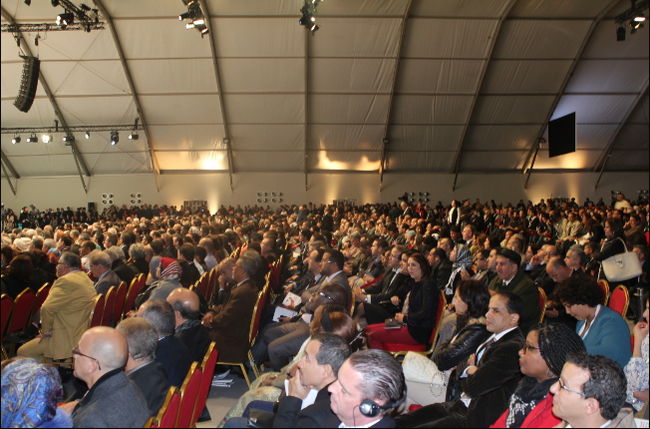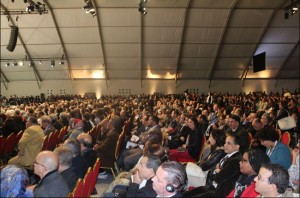By Siham Ali in Rabat, Imrane Binoual in Casablanca and Jemal Oumar in Nouakchott
for Magharebia
Marrakech hosts the 2nd World Human Rights Forum
Participants at the World Human Rights Forum in Marrakech call for a rejection of extremist and violent currents.
The 2nd World Human Rights Forum (WHRF) drew activists, political leaders, professors and students from 94 countries to Marrakech this week.
The president of Tunisia’s Chokri Belaid Foundation Against Violence was among the 5,000 people attending the 4-day Moroccan event, which wrapped up on Sunday (November 30th).
Basma Khalfaoui Belaid, the widow of the slain Tunisian political figure, underlined the need to “mobilise all components of society to defend human rights” and build a modern democratic state”
Tunisians were determined to fight peacefully against all violence, she added.
Forum participants agreed that promoting human rights would help resolve other problems facing the Maghreb region and the world community.
European Union Special Representative for Human Rights Stavros Lambrinidi stressed the need to confront “the extremists and obscurantist forces who want to impose their laws on populations and the most vulnerable people”.
Public awareness of the issue is growing, according to Tunis researcher Obaid Khlifi.
Civil society is “witnessing a rapid and dramatic development in forming associations, forums and research institutions in the field of democracy and human rights”, the academic said.
The president of the Moroccan Forum for Truth and Justice, Mustapha Manouzi, noted that there had been a big civil rights movement in Morocco since 1999.
For his part, Moroccan Education Minister Rachid Belmokhtar underlined the importance of teaching very young children about human rights, in order to “have a rising generation that respects these values and fulfills all of its rights and duties as good citizens”.
The national education system has made much progress in promoting human rights culture through curricula, teaching methods, textbooks and school life in general, the minister said.
Mauritania recently launched a similar initiative.
The education ministry in October began a project to integrate human rights culture and concepts into Mauritanian school programmes.
According to Ali Ould Rafea of the University of Nouakchott, “Young people have a contemporary vision in addressing human rights issues, and maybe they are better able to understand the concepts needed to be integrated for current and future generations.”
He went on: “I think that prevailing religious ideas play a major role in the human rights problem, such as the lack of social harmony and the complex related to acceptance of others and co-existence, and the continuation of slavery and racism.
“This is why we should focus on this point through the reformulation of religious fatwas and prevailing religious rules that consolidate disparities and hostile views of others,” the academic added.
Education, Ould Rafea added, was “the only way to address racism, the culture of exclusion and the perception of inferiority on the basis of race, colour, religion and culture”.
Zeinab Mint Sid Ahmed, a student at the University of Nouakchott, echoed that sentiment.
“The teaching of the culture of human rights will make us understand each other’s particularities,” she said. “This will contribute to more openness and acceptance of each other.”








